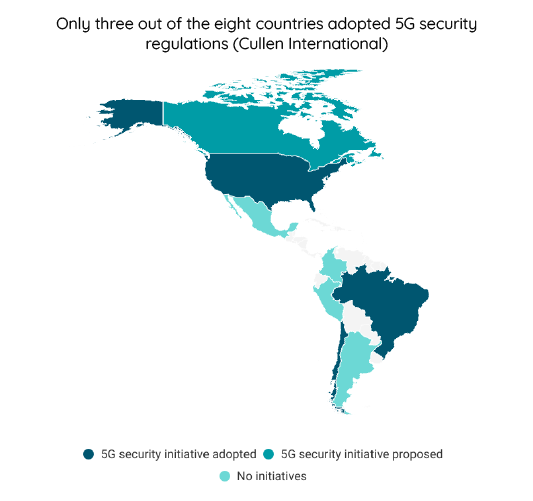Cullen International’s new benchmark on 5G national security in the Americas region shows that Brazil, Chile and the United States are the only researched countries that have adopted network security measures that apply to 5G networks.
Brazil and Chile generally require telecoms network operators to implement cybersecurity policies and report serious incidents involving network security. Brazil requires operators to send detailed information to Anatel on critical network infrastructure, while Chile mandates operators designate a cybersecurity officer.
The US is the only researched country in the region to have restrictions in place against high-risk vendors in 5G networks. Operators must remove and replace equipment from companies in a list maintained by the federal telecoms regulator (FCC).

In Canada, a government bill under Senate review would require designated operators to implement cybersecurity programs, manage supply chain risks, and report incidents. The Canadian government announced plans to prohibit the use of products and services from vendors such as Huawei and ZTE.
To access the full benchmark, please click on “Access the full content” - or on “Request Access”, in case you are not subscribed to our Americas Digital Economy service.
>> See also our benchmark on 5G security measures across Europe!
more news
23 February 26
The DNA explained: universal service to serve the same goals under a revised approach
Cullen International is issuing a series of analyses on different aspects of the Digital Networks Act (DNA) proposal. This report covers universal service.
20 February 26
Revised Cybersecurity Act (CSA2) - Changes to the EU cybersecurity certification framework
Cullen International published an analysis of the proposed changes to the EU cybersecurity certification framework under the draft Cybersecurity Act 2 (CSA2) delivered by the European Commission on 20 January 2026.
19 February 26
Upper 6 GHz band: EU member states wait for EU-level decisions
Cullen International has been monitoring regulation of the upper 6 GHz band at the European level and now also benchmarks regulation at the national level in Europe.